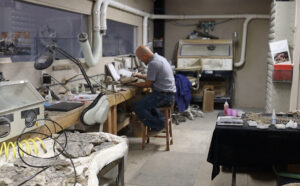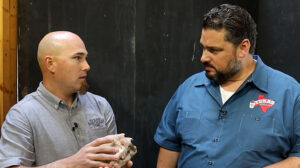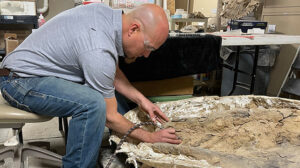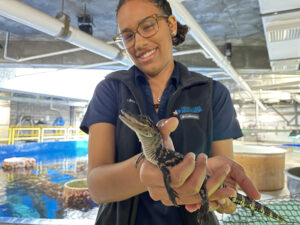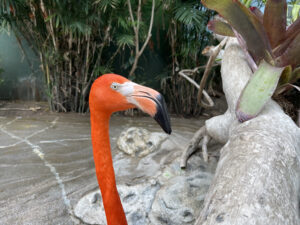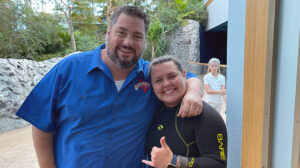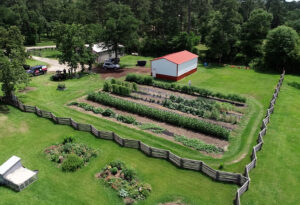
On the backroads of Plantersville, Texas, you’ll fittingly find a lush green garden planted by a passionate producer with the perfect name, Gary Green. Gary’s got one goal when it comes to his line of work. “We like helping people and our thing is about growing food and doing it in an innovative way,” Gary said.
With a variety of vegetables and flowers growing in his garden, it seems the vegetation in this part of Plantersville does really well, and the secret is in the soil, or at least what Gary adds to it. “Everything that a plant needs to grow to its full potential is in there,” said Gary pointing to a container filled with dirt.
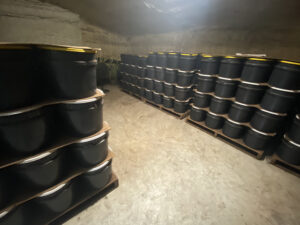
You see Gary’s got a squiggly side hustle that involves dealing with dirt that’s been processed in a particular way. It goes through a worm. “Back in another life, I had a job where it wasn’t making much money, but I had an empty basement, so I said, okay, we’re in the fishing capital of the world. Everybody’s got to have worms if they’re going to go fishing so I thought I’d raise some worms,” Gary explained. “I found out that what the worms make is much more valuable than the worms, and what they make is worm castings. For those who are not familiar with worm castings, what is it? To put it bluntly, it’s worm poop,” said Gary.
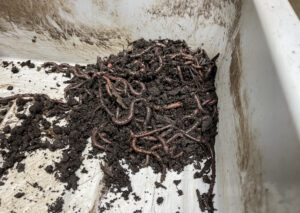
While it’s technically number 2, worm castings are number 1 in Gary’s book when it comes to growing some great vegetables. And that’s all he does at his Worm Ranch. “If you had a microscope or a magnifying glass, you would see little footballs. When the material goes through the worm, it coats it in what’s called polysaccharides and makes little footballs. That’s the worm poop,” Gary explained. “But that is the best castings in the United States right there. Worms are deaf, blind, they have no spine, but they are one of the most amazing creatures on the planet,” Gary said.
It all starts with a bucket, some dirt, and some worms, lots and lots of worms. Next, Gary showed me the earthworm domicile where hundreds of thousands of worms are housed. “This is it right here. There are actually eight towers of worms in here. 64 cans on each tower. There are 128,000 African Nightcrawlers housed in here, enjoying the luxury of life. It’s 70 to 75 year-round, 365, 24/7, so they lead a pretty good life in here,” Gary explained. “They’re doing their job. What goes in the front of the worm comes out of the back of the worm, and that’s what we’re after.”
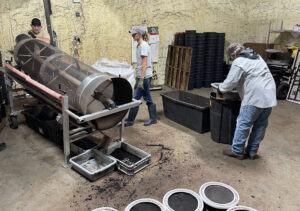
Now when it comes time for the worms to wiggle their way out of the dirt, that’s when they get to go through the worm tunnel. Basically, a mesh tube that spins. Gary said the worms can’t go through the screen because they’re too fat and happy, but they wind up going out at the end and falling into that tub. But the castings go through the screen and fall into tubs down underneath.
These castings are what you’ll find in Gary’s garden. “So Shane, this is the Return to Eden. The Magic Garden. Here’s where you will see the magic of earthworm castings. This garden was saturated with worm castings into the compost to make the dirt, the soil, the best that it could be,” said Gary as we walked through his garden.
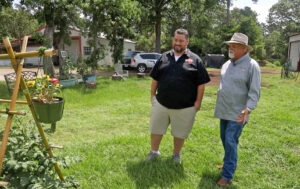
Of course, I had to taste the end product. So, I tried a snap pea straight from the garden. Man, if vegetable tasted like that, I would eat a lot more vegetables. “The plant had the ability to take in all those nutrients to make it the best that it could be, and the castings made that happen,” Gary said. “That garden out there is one-twelfth of an acre. It will produce about four to 5,000 pounds of food this year. We can’t eat it all. We give a lot to the neighbors, but a lot of the food that we grow out there goes to the SOS Food Bank in Magnolia. We feed people. We also use the garden to show people how to grow food for their family.”
So, if seeing worms work their magic is on your bucket list, this worm ranch will rope you in, no saddle needed course. “How to garden without killing the soil, without hurting the environment and helping to make the planet a better place for us to live and a better place for their kids down the road; support global worming. Got to be careful how you say this. It’s not warming, it’s worming. Support global worming,” said Gary.
